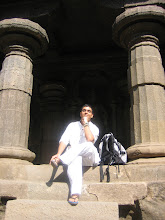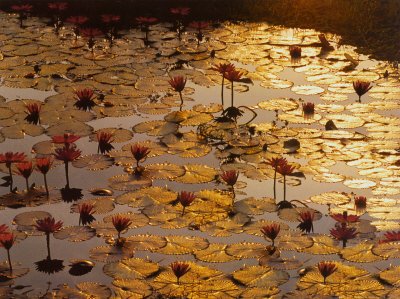The 'hero' archetype is one that is truly universal. In every culture and country, throughout all periods of time, we can find people who are considered heroes. David Bowie, the "chameleon of rock" who always seems ahead of his time, needs no introduction. So what happens when David Bowie makes the 'hero' a subject of his artistic talents? A really great song!
My first exposure to this song was in 1998 via The Wallflowers' cover. Theirs was an admirable and catchy attempt although, as is the case with most covers, the original version is unbeatable.
I, I wish you could swim.The hero motif runs very deep within the Buddha's Dharma. Many of the epithets or titles of a buddha have very heroic rings to them. The Transcendent Perfection of Energy/Diligence is known as virya pāramitā (विर्य पारमिता), with 'virya' (a cognate with the Latin 'virlis' and English 'virile') implying great heroism. 'Arhat' (अर्हत्) means "one worthy of offerings", 'bhagavat' (भगवत्) means "blessed one", and jinā (जिना), a term also applied to Jain tirthankars, means "victor" or "victorious one". The names go on but the take home message is that enlightened beings (buddhas, bodhisattvas, and arhats) are heroes. Before delving into what makes these beings heroic, let's first look at how heroes arise.
Like the dolphins-like dolphins can swim.
Though nothing-nothing will keep us together.
We can beat them-for ever and ever.
As Lao Tzu says "a journey of a thousand miles starts under one's feet". For those who wind up walking the Path of Awakening, the journey starts with an aspiration: a big one. To "wish to swim" is one thing but wishing to "swim like a dolphin" is bigger still. In the same way, the wish to be freed from suffering is big but the aspiration to become enlightened for the benefit of all beings is bigger still. Splashing in the kiddie pool to stay afloat is incomparable to a majestic dolphin effortlessly gliding through the vast oceans. This resolution, known in the texts as bodhicitta (बोधिचित्त), is often called the Supreme Resolution or the Greatest of all Thoughts.
To make such a lofty vow seems inconceivable at best and at worst, just plain impossible. Yet this vow is the fundamental motivation for the practice of bodhisattvas. When viewed in this light, all practice can take on farther reaching, cosmic attributes. For example, in many Mahayana temples, the Three Refuges are recited with slight modifications that reflect the vastness of the bodhisattva's vows:
"I take refuge in the Buddha, and I wish that all sentient beings will awaken to the Great Path and make the Supreme Resolution.
I take refuge in the Dharma, and I wish that all sentient beings will delve into the sutras, their wisdom and deep as the ocean.
I take refuge in the Sangha, and I wish that all sentient beings will be brought together in great harmony, without any obstructions at all".
In the first teaching after his enlightenment, the Buddha said that suffering (partly) consists of being separated from what we love. As we move from life to life, it is inevitable that the closest and dearest relationships we have, such as those with our spouses, parents, siblings, children, friends, teachers, etc., will be broken by old age, sickness, and finally death. Sound morbid? Welcome to samsara (संसार). Although "nothing can keep us together", it is certainly possible for us to go beyond the cycle of suffering and the cycle of birth and death. We "can beat them for ever and ever" if we take the "them" to refer to Mara (मार), the personification/representation of all that negative in cycle of existence.
Oh we can be heroes-just for one day.
The word 'hero' comes from the ancient Greek term 'hērōs' (ἥρως ) and originally referred to epic characters that were somewhere between gods and mortals. Many great heroes of the Classic Western epics (Odysseus, Aeneas, Achilles, etc.) were mortals with "divine blood" running through their veins.
Upon hearing the word 'hero', our minds immediately jump to lofty descriptions about people who do deeds that no on else can perform, endure things that no one else can endure, and know things that no one else can know. In the texts, beautiful and eloquent descriptions abound regarding the Buddha, his disciplines, the bodhisattvas, and others who are considered heroes.
It is not only the great wisdom, compassion, diligence, patience, and virtue which makes enlightened beings heroes. The main reason why they're called heroes is because they have gone beyond suffering and have helped, are helping, and will help others go beyond suffering as well.
By saying "we can be heroes", Bowie touches on a vitally unique aspect of the Buddha's teachings, i.e. when we walk the path of Awakening, we walk the same path that the buddha and all other enlightened beings walk. For example, The Heart Sutra says:
All buddhas of the past, present, and future, also take refuge in Prajñāpāramitā (प्रज्ञापारमिता - The Perfection of Wisdom) and realize unexcelled, perfect enlightenment (अनुत्तरांसम्यक्संबोधि - anuttara samyak sambodhi).
-(translated by Bill Porter/Red Pine).
In Western monotheism, statements like "I can be Jesus" or "I can be the Prophet Mohammad" would be indefensibly blasphemous and heretical. For a practitioner of the Buddha Dharma to say "I can be a buddha" is the definition of the Supreme Resolution (vide supra) and is, in the Mahayana tradition, the fundamental purpose of practice.
A hero is a hero, no matter if its for eternity or just for one day. Similarly, all it takes is a single penetrating insight to really change the way we view the world and interact with it. In the Platform Sutra, the Sixth Ch'an Patriarch Hui Neng says:
"Just as one lamp can disperse the darkness of a thousand years, one thought of wisdom can destroy ten thousand years of delusion".
-(Buddhist Text Translation Society Translation)
The Dhammapada expresses a related idea:
"Better than one hundred years lived
Without seeing the ultimate Dharma
Is one day lived
Seeing the ultimate Dharma"
-Ch. 9, verse 112, translated by Gil Fronsdal
I, I will be king
And you-you will be queen
Though nothing will drive them away
We can be heroes-just for one day
We can beat them-just for one day
 We've established what makes a hero and how heroes arise. These lines and all the rest that follow reiterate the same point: we can be heroes. You, me, our parents, our neighbors, our favorite barista, the glamorous celebrity, the drunken beggar, all of us have the capacity to be heroes.
We've established what makes a hero and how heroes arise. These lines and all the rest that follow reiterate the same point: we can be heroes. You, me, our parents, our neighbors, our favorite barista, the glamorous celebrity, the drunken beggar, all of us have the capacity to be heroes.As for being "kings and queens", bodhisattvas are usually depicted wearing the garbs of royalty, often adorned with wonderful jewels, crowns, necklaces, etc. One reason for this has little to do with aesthetics. Heroes can come in many, many forms. This is shown in the final chapter of the Avatamsaka Sutra, (known as the Gandavyuha or Entry into the Inconceivable) where the spiritual pilgrim Sudhana meets and receives Dharma teachings from kings, children, courtesans, goddesses, and many others.
The seemingly impossible nature of treading the bodhisattva path was mentioned earlier and the line "though nothing will drive them away" is yet another reference to this idea. The Four Great Vows address the idea of "impossibility" by showing that we can be heroes even if we "don't drive away" the unskillful aspects of our being all at once:
Sentient beings are numberless; I vow to save them.
Desires are inexhaustible; I vow to put an end to them.
Dharmas are boundless; I vow to master them.
The Buddha Way is unattainable; I vow to attain it.
-translated by the Mountains and Rivers Order of Zen Buddhism
I, I can rememberMuch has been said about the lofty attributes of epic heroes and while it can be very helpful to draw inspiration and motivation from these people and their stories, it is vital to not lose perspective in regards to the "ordinary world". Epic heroes may be the subject of Hollywood blockbusters but sometimes it's the mundane deeds of everyday heroes that make the profound impression on us.
Standing-by the wall
And the guns-shot above our heads
And we kissed-as though nothing could fall
And the shame-was on the other side
Oh we can beat them-forever and ever
Then we could be heroes-just for one day
We can be heroes (3x)
Just for one day
Not many people wake up with the thought "I will do a heroic deed today!" Many times, being a hero means doing something ordinary in an extraordinary circumstance. The little story Bowie presents in these lines are an example of this. It starts out with him simply "standing by a wall" but we soon find out that there are "guns" are "shots above our heads", implying he's in the middle of a war zone or shootout of some sort.
In the midst of such chaos, he does something seemingly bizarre: he kisses someone. In many cultures, particularly the West, a kiss is an expression of love, affection, intimacy, and endearment. War has the terrible ability to dehumanize people and bring out the worst that humanity has within itself and yet Bowie opens his heart by kissing "as though nothing could fall". Kissing the ones we love in a normal situation can seem like a natural, if mundane thing to do but the heroic stance taken by Bowie underscores how important it is to pay attention to the everyday occurrences in our lives.
There is a famous koan where master Zhaozhou (趙州從諗) asks Nanquan (南泉普願) what The Way is. Nanquan replies by saying "Ordinary mind is the way".
Layman Pang, the famous Ch'an master was once asked what he was up to. His now famous words were "before enlightenment, I chopped wood and carried water. After enlightenment, I chopped wood and carried water".
Having embraced his loved one, Bowie tells us that "the shame-was on the other side" of the wall. The Buddha's famous discourse on loving-kindness, the Metta Sutta says:
...So with a boundless heart
Should one cherish all living beings.
Radiating kindness over the entire world.
Spreading upwards to the skies And downwards to the depths,
Outwards and unbounded, Freed from hatred and ill-will...
-from the Abhayagiri Monastery Chanting Book
In his famous essay, "East and West", Rabindranth Tagore speaks of love's power in the context of the Buddha and how his teachings shattered many walls:
"We know of an instance in our own history of India, when a great personality, both in his life and voice, struck the keynote of that solemn music of the soul - love for all creatures. And that music crossed seas, mountains, and deserts. Races belonging to different climates, habits, and languages were drawn together, not in the clash of arms, not in the conflict of exploitation, but in the harmony of life, in amity and peace".
The song concludes with the previous exhortations of how we can be heroes, even if its just for one day. What, however, happens when we become heroes? According the last chapter of the Dhammapada:
"Whoever, having given up liking and disliking,
Has become cooled, without attachments,
A hero overcoming the entire world,
I call a brahmin".
-Ch. 26, verse 418, translated by Gil Fronsdal








No comments:
Post a Comment